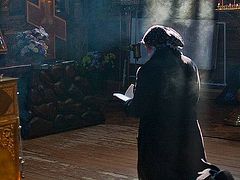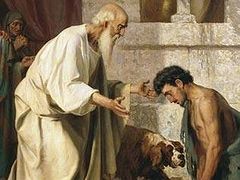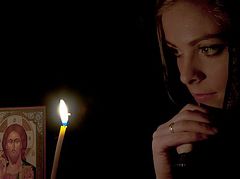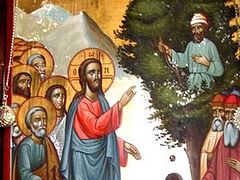The following is from a discussion on Ancient Faith Radio, by Fr. Evan Armatas and John Maddox, as part of their "Orthodoxy Live" program. This discussion is especially aimed at those who are new to Great Lent, but even those who have been practicing the Lenten fast all their lives will find much interesting and helpful information that they may not already know. More questions about Great Lent can be asked on the "Orthodoxy Live" homepage, on their website.
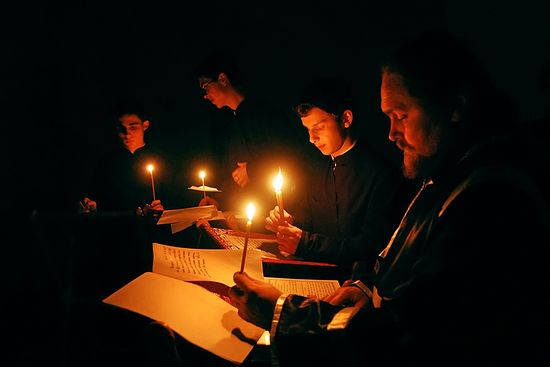
John Maddox: Why do Great Lent? Why is this so important?
Fr. Evan: Let's start with an orientation in the season itself. Then let's go to some of the themes and reasons why we go through this season, what it accomplishes, and how it helps us in our relationship with Christ. Recently I was visiting with a newly illumined [newly baptized,--Ed.] member of my community. He is approaching his second Lenten season. I asked him a very innocuous question. I said "How are you doing?" He looked at me and said, "You know, Father, I need Lent." I walked away from that thinking, "Isn't that interesting. It's only his second time through and he's already recognized the need for Great Lent." Having gone through it once, and having gone through the rest of the year, He sees a need for that season once again in his life.
John Maddox: Some are probably saying, "Really?" And others are saying, "I can relate".
Fr. Evan: I can relate. So why is it that some would see a need for Great and Holy Lent? We said we were going to talk about the themes and the reasons; I think some of the reasons for Great Lent are in the calendar of events that proceed and mark our time through Great Lent. So let’s step back and take a look. We know that the Orthodox Church has a liturgical calendar.
John Maddox: Yes, part of the rhythm of being an Orthodox Christian…
Fr. Evan: Is being in the Liturgical calendar. Christians outside the Orthodox world or those looking at Orthodoxy shouldn't shake their heads and be completely mystified by this because they themselves have a remnant of a Liturgical calendar. They still go to church on Sunday. That's a liturgical day. When we say liturgical, we mean that old word liturgia, the work of the people—the worship of God, the reality of man's approach to God and God's descent to man. Now, when we speak of a liturgical season: all are also familiar with Christmas, which comes every year on the 25th of December.
John Maddox: They don't celebrate it on July 25th, but only on December 25th.
Fr. Evan: December 25th is a fixed date the Church has set. It's very curious to note that we celebrate the Annunciation of the good news to the Mother of God nine months before the Nativity, on March 25th.
John Maddox: That makes sense.
Fr. Evan: It does make sense. We call Easter Pascha (and almost every country in the world calls it Pascha, except for England, Australia, and a few other English speaking countries). The ancient word for this feast is "Pascha", which comes from the Hebrew word for Passover—the great event of the Lord’s passing over the first born of Israel. In other words, having the Angel of death pass over them, and through the blood of the lamb that is spread over the lintels of their homes, they are spared.
So this season of Pascha, proceeded by Great Lent and a period called the Tridion, which we are going to get into in just a moment, is a season that highlights the Church year and orients us. For the Orthodox, there is more to it than simply showing up on Easter morning and wearing a fancy hat, or going out for breakfast after the service, and singing special hymn or two. It is incorporated into something much larger than that. I think that by understanding what's going on we can enter into the season better prepared for the journey. Prior to Great Lent, the Church enters a pre-preparatory period. Are you wondering why I'm using that phrase?
John Maddox: Pre-preparatory? It's the Lent before the Lent.
Fr. Evan: Yes. Lent itself is preparatory but there is a pre-Lent period in the Tridion, which is a word or phrase that doesn't have much to do with the season itself—but let's talk about it.
Sunday of the Publican and the Pharisee
There are four Sundays or four weeks that proceed Lent. The first of them is heralded by a Gospel reading from St. Luke. It's the Sunday of the Publican and the Pharisee. It is a parable many of us are familiar with, in which two men go into the temple to pray. One is quite proud of his accomplishments—that one is the Pharisee. The other is the Publican, who beats his breast and refuses to lift his eyes to Heaven. What is on display from the beginning is the story of pride and the story of humility. The Church seems to be telling us, and the Gospel itself is reminding us that as we enter the season, we first have to deal with the two opposite realities of the gateway virtue of humility and the gateway vice of pride—and what they lead to.
John Maddox: And lest we think that this is a legalistic endeavor, during that week there is no fasting—even on Wednesday and Friday. Am I correct?
Fr. Evan: Yes. This is a week in which the Church does not fast. It reminds us that the fast and “the letter of the law” action of a Christian are not transactional. They don't automatically make us holy or closer to God. And in fact, if we enter into the Lenten season like the Pharisee, who recounted all of the good things he was doing: he was tithing, he was praying, and he was going to the temple. He was doing all the things we might look at and say, "That's correct religion", but he did not leave the temple justified. So we are reminded right away, if the heart's not right then everything that is going to follow in the season will do you no good.
John Maddox: Maybe he was doing all of those things but we are not—we are only reading the labels on the cans in the grocery store. But it is the same thing.
Fr. Evan: So that is the first reading that tells us, "Great Lent is just around the corner, and you are entering into a period of time that gets you ready for it.” Some people might say, "Well okay, if Great Lent itself is preparation for the celebration of Pascha, why do I need this preparation season before Great Lent?"
John Maddox: Good question.
Fr. Evan: This is just a reality. I think that it is never stated enough, that of all the institutions on earth, the one that understands man the best is the Church. And the Church knows in her wisdom that it's hard for us to uproot our sin, to be separated from our iniquity; and it's hard to get an object that is no longer in motion moving. Things that rest tend to stay at rest. What if I were to say to you, "Hey John, let's meet tomorrow and run twenty miles."
John Maddox: I would drop dead if you said let's run half a mile.
Fr. Evan: So, Lent is an arduous journey. It's a marathon. In order to be able to finish the race like St. Paul, it is prudent to spend some time preparing. Stretching, warm-up exercises, run half a mile. So, you will see as we go through the Tridion, the fast begins to begin in earnest.
John Maddox: We are easing into it, aren't we?
Fr. Evan: Yes, we ease into it. We get ourselves ready.
Sunday of the Prodigal Son
The second Sunday is the Sunday of the Prodigal Son. This is another famous parable in the Gospel of St. Luke, and many have said that if we were to lose the entire New Testament except for this story, we would still have the Gospel. This story is about a young son who decides to ask his father for his inheritance before the appointed time, and the father generously gives it to him. Then he goes off and squanders it in loose living. He comes to a point of great depravity. Sound familiar?
Here is a man who goes through a journey that each of us goes through in our own life. We take all of the blessings that we receive from God, all the blessings we receive from our parents, all the things that people have invested in us, and in our own way and in our own time, to a greater or lesser extent, we squander it. We ruin it, we defile it, we give it away. And we end up like the young man feeding swine, down in the muck with them, and remembering how good we had it. I think that is where the story begins—where the young man comes to himself and rises, saying to himself, "I'm going to return to my father's home and I'm going to tell him, ‘I'm not worthy to be called your son, for I have sinned against Heaven and earth, and against you. Accepted me as one of your hired servants.’” This is the start of the Christian journey. It is realization that we have sinned, that we need to repent, to return—in a spirit of humility and acceptance of whatever God has in store for us.
John Maddox: And at the same time, there is the overwhelming love and acceptance of the father.
Fr. Evan: That's where the story leads. Some have said this could be called the Parable of the Loving Father. Because as the prodigal returns, in the distance his father is searching for him. Notice in the text, that the father runs and embraces this child of his, bending down and kissing his neck, and does not even let the son get his confession out. He restores him immediately. We could even say he elevates his position. He kills the fatted calf, places a ring on his finger, puts a robe on him. These are all symbolic and archetypal phrases to symbolize and speak of the exalted stature of this penitent son.
John Maddox: So far, we've learned not to be self righteous, and that it's all a matter of grace. When we sin, we have a forgiving, loving father to come back to. What's next?
Meatfare Sunday
Fr. Evan: What's next is quite interesting: we move into the next Sunday, often called in many of our churches Meatfare Sunday. Does your parish do anything special on that day?
John Maddox: Oh yes, we eat a lot of meat!
Fr. Evan: The original context for Meatfare Sunday is that most people didn't used to have refrigeration like we do; there weren't grocerey stores like we have, and so as people came to this season, they often had leftovers in their storehouses. So, this was an opportunity to consume the rest of these products or to share them with their brothers in need, because they knew the Fast was coming, and they would not be eating meat from here forward. So, they had a celebration where they would share with their neighbors. Some of our parishes still do this—they have this celebration. But what we are going to find is that most of the Sundays of either the preparatory period of the Tridion or Great Lent itself have two themes. We may know it as Meatfare Sunday, but the deeper meaning is of the Final Judgment. Do you recall what passage of scripture is read on that Sunday?
John Maddox: It's in St. Matthew, right?
Fr. Evan: It's that rather terrifying picture of the Lord's return. In it He gathers the nations before Him and separates them as a shepherd would his sheep from the goats. We want to be sheep. So, what is really highlighted for us in this Sunday is the ultimate and final destination for all human beings. Where are you and I headed? We are headed toward the Judgment. We are headed toward the Lord. And we will have to account for our lives. There are criteria for Judgment that the Lord levels upon the sheep and the goats. He reminds those who are in the world that when they are brought before Him, His judgment will be based on our love. It's the criteria that He uses. Have we demonstrated love for God and for neighbor? And lest we become gnostic, or disconnected from the truly difficult actions of Godly living, the Lord gives us a list of what he finds acceptable. Those who are His sheep will have fed the hungry, clothed the naked, given drink to the thirsty, visited those in prison. Does this bring to mind any words from the prophet Isaiah? Do you remember that famous passage where the Lord is speaking through the prophet Isaiah, describing the type of fast that He desires? “To set free the captives, to take in those who are without homes and bring them into your own home.” This is an account of a fast acceptable to the Lord. If we are not careful, we can look at the fast in an overly spiritualized way. We can forget that the fast is meant to lead us toward righteousness. And if we are not careful, we will completely miss the "love of neighbor": the love of God through actions of right living.
John Maddox: So, we have learned not to be self righteous, we’ve learned that we have a loving and forgiving Father ready to receive us, and we have also learned that there is a last judgment, an accounting. That accounting is based on the love of God, but it is a love we will either welcome, or be terrified of.
Fr. Evan: Yes, and it's a love that will be demonstrated through our love for others. It's going to be real love—not a gnostic, mental love, or even an emotive love. It's real love. To my own community I often put it this way. Fr. Alexander Schemann speaks about the “journey to Pascha”; I love that phrase and use it all the time. This is a journey, and in order to go on a journey you have to pack for it. I used to be fascinated by the thought of climbers on Mt. Everest. I would always ask people, "How long does it take to climb Mt. Everest?" People would Google the information and say, "Oh, it takes X amount of days." I would say, "No, it takes over two years." They would say, "What are you talking about? No one climbs Mt. Everest for two years." And I would say, "Every successful expedition up Mt. Everest takes about two years to plan." So we know in the Church that if we are going to get through Great Lent, if we are going to arrive safely at our destination of Pascha, then we've got to take time to prepare and pack for the journey. So as you mentioned in your assessment of these Sundays, we have to take these things with us on our journey. If they don't accompany us, we aren't going to make it.
Cheesefare Sunday
So, we come to the last preparatory Sunday, known as Cheesefare Sunday. It is the day that we use up the store of dairy products in our homes; but as I’ve told you before, there are multiple themes in play here. Cheesefare Sunday is also known as the Sunday we learn of Adam's expulsion from Paradise. We learn of that reality—or rather we consider it again.
John Maddox: Just to back up again a little bit, lest people forget what we talked about in connection with Meatfare: We consumed a lot of meat on Sunday, and realize, "Okay, that's it for now." For the next week between Meatfare and Cheesefare [and until Pascha.—Ed.], we aren't eating meat. We are permitted to eat cheese and dairy products during this week, but now we have eased into the fast.
Fr. Evan: Now the fast starts to take full affect. With Cheesefare Sunday, and with the theme of Adam's expulsion from Paradise, the Church adds a third layer, which is really the last lesson that has to be learned before entering into this season. Thus, many of us know this Sunday as Forgiveness Sunday.
John Maddox: For many, this is the most precious day of the year aside from Pascha itself.
Fr. Evan: On this Sunday we read once again from St. Matthew. We have read two Gospels from St. Luke, about the Publican and the Pharisee and about the Prodigal Son, and then we read the Last Judgment in St. Matthew. Now we read chapter six from St. Matthew with that key verse: “If you forgive men their trespasses, your heavenly Father will also forgive you.” The Lord reminds us that one of the things we have to pack for our journey is forgiveness. The Lord tells us that forgiveness of our brother’s sins is what will open the door of forgiveness to us.
John Maddox: Furthermore, it is not as if we have an option. This is something that I really need to wrap my arms around. It is a condition. It literally means, "If you cannot or will not forgive your brother, I will not and cannot forgive you."
Fr. Evan: It is interesting that you would bring that up. Just last week, a young woman, a Protestant girl in her teens, came to me interested in some of the Orthodox teachings on forgiveness. She said, "I don't have to do anything to receive forgiveness." There's an element of truth there. On the other hand, there are plenty of scriptural admonitions that if we don't forgive we won't be forgiven. It's there in the Lord's prayer. It's in St. Luke's Gospel: "The measure we use, shall be used unto us." It's in the Gospel of St. Matthew, chapter 6. Again and again, we see in the parable in Matthew 18 of the unjust steward that when the man couldn't forgive his brother the debt, his master throws him into prison. And it says, "So shall the Lord do to you, unless you forgive your brother from your heart." Here we begin some of the unusual services of the season that are quite powerful even for us who have known the season for years. I am talking about the Vespers of Forgiveness.
John Maddox: Yes, talk about that. That's such a beautiful service.
Fr. Evan: It is. It is so powerful for communities that participate in this service that it is often accompanied by two tiers of repentance. The Lenten season, as I mentioned in our opening, has a number of particular and special services and prayers specific to it. In the Tridion, it is heralded in the first service that accompanies the Sunday of the Publican and the Pharisee by the hymn, "Open unto me the gates of repentance." This hymn is sung right after the Fiftieth Psalm during the Orthos, or Matins service. But for the most part, what's going on in the Liturgical life of the Church is pretty common and usual. People may not notice anything different. We do notice that on one Sunday we've eaten the last of our meat, the next Sunday we’ve consumed the last of our dairy products; but all of the sudden, on the Sunday when we've eaten the last of our dairy, on the evening before to Clean Monday, the Church celebrates Forgiveness Vespers. What happens? One of the most obvious changes is that the church changes her garb. The altar cloths and vestments are changed from bright to dark. In the service itself, the highlight is the act of asking for forgiveness and granting forgiveness to one another. So the kiss of peace and the kiss of forgiveness is given.
I don't know exactly how it's done in the parish you attend, but in most parishes, at the conclusion of the Vespers, the priest comes out and asks forgiveness from his brothers and sisters in the Lord. Then one by one they come up, embrace and kiss one another, often kissing one another's hands asking for forgiveness. They stand to the right of the priest, and each parishioner goes up until the entire parish has had an opportunity to ask for and receive forgiveness from their brothers and sisters.
John Maddox: It's the same in virtually every parish I've ever visited, and it's beautiful. I was visiting Oklahoma City one year on Forgiveness Sunday and attended the St. Elijah Antiocian Orthodox Church, but knew very few people there. Nevertheless, I participated in the Forgiveness Vespers, and it was just as meaningful there as it was in my own parish.
Fr. Evan: Of course. Universal forgiveness is something we all look for and need on this journey. Then, specific forgiveness from anyone we've wronged. So I encourage my parishioners: in case that specific someone does not happen to be in the specific church where you are attending the Vespers, that doesn't get you off the hook. You still have to lay aside your gift before you come to the altar and be reconciled to your brother, as the Gospel tells us.
John Maddox: Yes, it can be an “easy out” if you leave it at that. “Well, I went around and asked everyone for forgiveness.” But if you didn’t say, for example, "Please forgive me for writing the mean email to you," you still have that in your heart. I think we need to be careful not to get too generic in our spirit of forgiveness, and to sincerely ask for forgiveness where it is needed.

